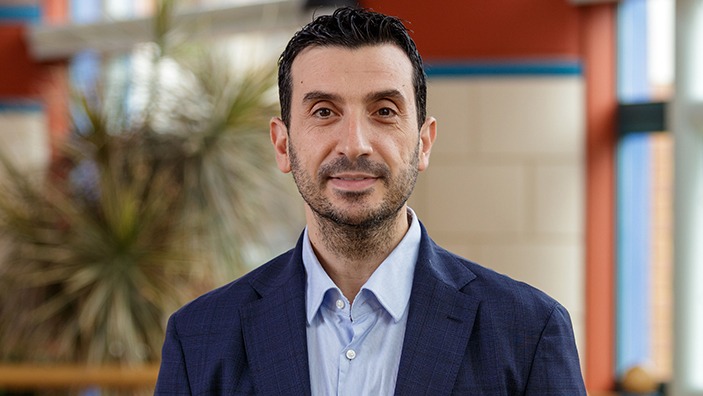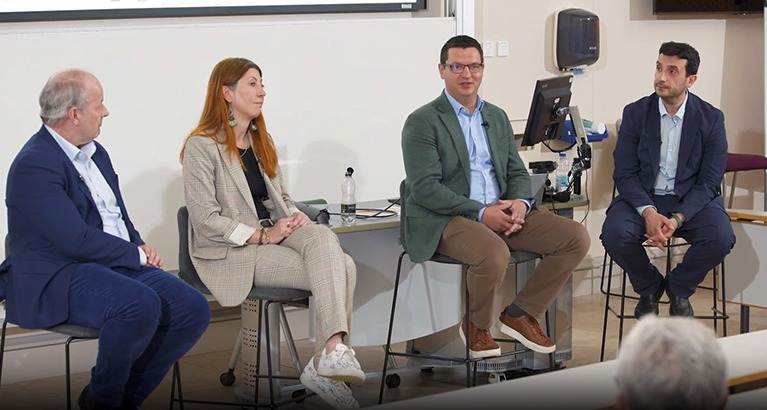
The panel discussion at Cambridge Judge Business School on 28 May examined how venture capital (VC) firms and more broadly investors and founders can help grow Europe’s biotech community through helping to forge key connections in the life sciences community.
Sander Slootweg, Founder and Managing Partner of leading European life science-focused venture capital firm Forbion, outlined how VCs can help ‘connect the dots’ in the European biotech community by helping to build enduring associations that can lead to further projects. Forbion currently manages €5 billion euros (£4.3 billion) and since its inception has made over 128 investments across 11 funds.
“Europe produces great science – highly cited papers, strong patents – but I think what’s still lacking, especially compared to the US, is experienced entrepreneurs,” Sander said on a panel moderated by Aris. “This business is all about long-term relationships. If you start small and build a good track record, you stay close to people you’ve worked well with.”
Relationships that matter in building biotech firms
Panellist Mihriban Tuna, CEO of Cambridge-based biotech firm Immutrin, which focuses on diseases caused by protein deposits in vital organs, echoed the importance of such networking and partnerships.
“Investment from the VC side and the fundraising from the company side is really about becoming one team from both sides and building that relationship, building trust, and building common understanding of where you know the company should go,” she said. VCs “push us to look ahead: What will the landscape look like 5 years down the line? What will be approved? What’s our niche? These conversations help us refine our strategy. It’s challenging, but it makes us stronger.”
If the science failed despite flawless execution, we’ll work with that team again. Some teams are so good, we’ll help them find a new asset. Science often fails, but transparency and good decision-making are respected.
Carmine Cicelli, Director Direct Investments (Life Sciences) at British Business Bank, highlighted the need for open conversations during the due diligence process. “Getting a group of investors together and having them align around a plan is easier if you’ve got good relationships and you can have open conversations on the basis of data,” he said. “It’s about having a diversity of thought around the table so that they’re really interrogating that plan from multiple different angles and having the objective discussion about what is the best use of proceeds and how you’re going to optimise value for the company and ultimately deliver medicines to patients.”
An interesting question by an audience member posed whether failure affects one’s ability to raise investment again. Sander said: “It’s a tough call – knowing when to stop. If your thesis no longer holds, and the only option is a risky pivot, we usually say no. But if the science failed despite flawless execution, we’ll work with that team again.
“Some teams are so good, we’ll help them find a new asset. Science often fails, but transparency and good decision-making are respected.”
Cambridge Judge and biotech VC firm Forbion also produced a case study
The event was organised through an existing collaboration between Cambridge Judge and Forbion, which last year yielded a teaching case study called “Forbion: building companies that transform patients’ lives”. The case study, co-authored by Aris and Don Drakeman (a Cambridge Judge Fellow), has already proved popular with postgraduate and executive education programmes. It outlines the complex landscape of drug development, Forbion’s strategy that draws on platforms of different funds, and the deal evaluation process from early stages to final investment decisions. The case says that it “challenges students to analyse Forbion’s strategic options and provide recommendations for future growth, while considering the firm’s mission of impacting the healthcare sector through novel medicines”.
Aris says: “There has sometimes been a lack of clarity about the role of venture capital firms in the biotech sector, such as focusing only on the capital provided and overlooking how relationships, and in turn, companies are built. So we brought together a diverse panel of people from the life sciences ecosystem to help demystify those critical aspects of the biotech ecosystem. Cambridge Judge has really enjoyed and benefited from our ongoing connections to Forbion, and the panel discussion’s emphasis on forging lasting connections reflected how new opportunities arise from enduring relationships.”
Featured research
Oraiopoulos, N. and Drakeman, D. (2024) “Forbion: building companies that transform patients’ lives.” Case no.324-0257-1





